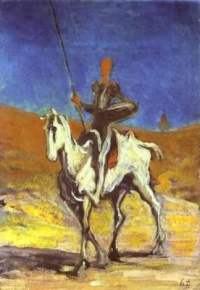Utopia
From The Art and Popular Culture Encyclopedia
|
“When I say utopia has failed, I mean simply that the twentieth century has cruelly disappointed the expectations of the nineteenth century.” --From Utopia to Nightmare (1962) is a book by Chad Walsh |
|
Related e |
|
Featured: |
Utopia is a philosophical concept coined after Thomas More's novel Utopia.
The word utopia is derived from Greek: οὐ no, and τόπος, place, i.e. "no place" or "nowhere" or "place that does not exist" and in Thomas More novel it is an imaginary island, depicted as a perfect social, legal, and political system. It may be used pejoratively, to refer to a society that is unrealistic and impossible to realize. It has also been used to describe actual communities founded in attempts to create an ideal society. Contrast with dystopia.
Contents |
List of utopian literature
Pre-20th century
- Plato's Republic (written around 380 BCE) by Plato is one of the earliest conceptions of a utopia.
- The City of God (written 413–426 AD) by Augustine of Hippo, describes an ideal city, the "eternal" Jerusalem, the archetype of all Christian utopias.
- Tao Hua Yuan, (421) is a utopia for Chinese intellects.
- Al-Madina al-Fadila, written by Al-Farabi (874-950), where he theorized an ideal state as in Plato's The Republic. Al-Farabi represented religion as a symbolic rendering of truth, and, like Plato, saw it as the duty of the philosopher to provide guidance to the state.
- Utopia (1516) by Thomas More.
- Christianopolis (1619) by Johann Valentin Andreæ, describes a Christian utopia inhabited by a community of scholar-artisans and run as a democracy.
- The City of the Sun (1623) by Tommaso Campanella depicts a theocratic and egalitarian society.
- New Atlantis (1627) by Francis Bacon.
- Erewhon (1872) by Samuel Butler, constitute a satiric romp through a hidden utopia (with dystopian elements) in the mountains of New Zealand.
- News from Nowhere by William Morris (1892), Shows "Nowhere", a place without politics, a future society based on common ownership and democratic control of the means of production.
- Looking Backward (1888) by Edward Bellamy.
- Gloriana, or the Revolution of 1900 (1890) by Lady Florence Dixie. The female protagonist poses as a man, Hector l'Estrange, is elected to the House of Commons, and wins women the vote. The book ends in the year 1999, with a description of a prosperous and peaceful Britain governed by women.
20th century
- A Modern Utopia (1905) by H. G. Wells
- Islandia (1942), by Austin Tappan Wright, an imaginary island in the Southern Hemisphere, a utopia containing many Arcadian elements, including a policy of isolation from the outside world and a rejection of industrialism. (In a sequel by Mark Saxton (The Islar, 1969), the Islandians develop a modern air force to fend off hostile communist-allied neighbors, and debate whether to join the UN.)
- Walden Two (1948) by B. F. Skinner
- Big Planet (1957), by Jack Vance, depicts a world in which attempts by utopian misfits to set up new societies have gone haywire after many revert to savagery and violence. But one city, Kirstendale, sets up a successful order in which citizens constantly shift their status, titles and duties (from servant to aristocrat and back again) according to an elaborate schedule.
- Island (1962) by Aldous Huxley follows the story of Will Farnaby, a cynical journalist, who shipwrecks on the fictional island of Pala and experiences their unique culture and traditions which create a utopian society.
- The Lathe of Heaven (1971), by Ursula K. Le Guin, a man is able to "effectively" dream, changing waking reality. A psychologist to whom he goes for treatment tries to use the man's talent to improve society but finds that each of his "solutions" has disastrous unintended consequences.
- The Dispossessed (1974), by Ursula K. Le Guin, the story of two planets, one very much like the capitalist, materialistic, profligate United States and the other a "nonpropertarian" society in which private ownership is unknown and people merely uses as much of natural resources or finished goods as they need. The two worlds are walled off (as were the capitalist and Communist world at the time of its writing). A physicist named Shevek travels between the two world and compares in a literary structure much like that of Tolstoy's War and Peace.
- Ecotopia: The Notebooks and Reports of William Weston (1975) by Ernest Callenbach, ecological utopia in which the Pacific Northwest has seceded from the union to set up a new society.
- Woman on the Edge of Time (1976) by Marge Piercy, the story of a middle-aged Hispanic woman who has visions of two alternative futures, one utopian and the other dystopian.
- The Probability Broach (1980), by L. Neil Smith, presents both utopian and dystopian views of present day North America, through alternative outcomes of the American War for Independence.
- Always Coming Home (1985), by Ursula K. Le Guin, a combination of fiction and fictional anthropology about a society in California in the distant future.
- The Fifth Sacred Thing (1993), by Starhawk, a post-apocalyptic novel depicting two societies, one a sustainable economy based on social justice, and its neighbor, a militaristic and intolerant theocracy.
See also
- The Man from Utopia, a Frank Zappa album
- Aline and Valcour, a novel by Sade about a utopia
- Pirate utopia
- Land of milk and honey
- Cockaigne
.jpg)


